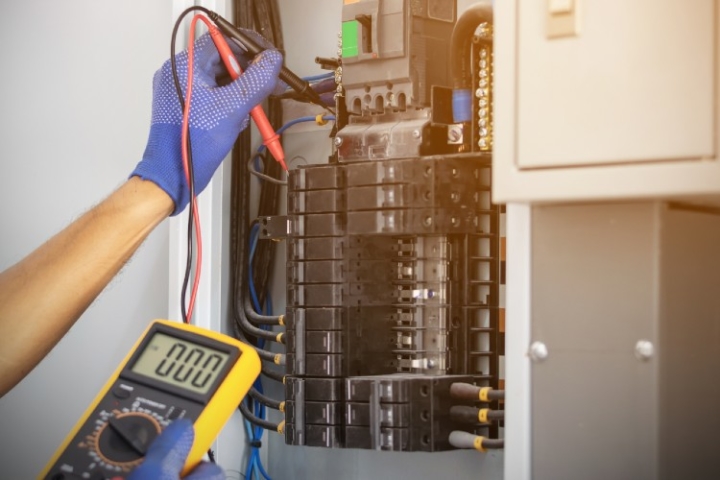Shifting Obsolete into Modern Standards: A Change through Wiring Assessments
Electrical systems are the cornerstone of modern homes and commercial properties, supplying power to everything from necessary equipment to sophisticated security systems. Yet, with the swift changes in technology and construction regulations, many sites can fall out of compliance with current electrical requirements. https://freedman-perkins-2.federatedjournals.com/hidden-dangers-revealing-risks-with-electrical-system-assessments is where electrical evaluations come into play, serving as a crucial safeguard to ensure protection, performance, and adherence. EICR Certificates Fife detect obsolete cabling or damaged parts but also highlight areas where enhancements can enhance energy efficiency and save expenses in the long run.
In an age where security is paramount, grasping the value of electrical inspections is critical for residence owners, commercial property owners, and tenants alike. Whether you are looking to transfer your property, ensure a safe habitat, or preserve your investment, the information gained from a thorough inspection can make a significant impact. From revealing common challenges to highlighting the role of assessments in preventing hazards, this article will guide you through the transformation of electrical infrastructures, helping them evolve from obsolete to compliant.
Understanding Power Inspections
Power inspections are essential reviews of a property's power system to verify that it meets current safety standards and guidelines. During an evaluation, a licensed electrician analyzes various components, including electrical wiring, panels, outlets, and fixtures, to detect any issues that could pose hazard risks. These inspections can help detect concerns such as overburdened circuits, old wiring, or malfunctioning appliances, which can lead to power fires or other dangers.
The value of electrotechnical inspections cannot be overstated, especially considering the potential consequences of overlooking them. Regular inspections help preserve a safe living environment, protect the efficiency of electrical systems, and can even reduce insurance premiums by minimizing risks. Moreover, for home buyers, having an power inspection carried out before buying can disclose latent issues that may lead to costly repairs down the line, providing peace of mind.
Given that electrotechnical codes and standards develop over time, keeping current is crucial for property owners. Inspections not only ensure adherence with local standards but also add to power efficiency and the overall functionality of electrical systems. Whether for domestic or commercial properties, grasping the scope and significance of electrotechnical inspections is crucial in fostering security and sustainability for any electrical installation.
Typical Issues and Protection Considerations
Electrical check-ups frequently reveal a variety of common problems that can threaten safety and functionality. Some of the most frequently detected concerns include outdated wiring, overburdened circuits, and faulty grounding. These issues can lead to serious risks such as electrical fires or equipment malfunction. Homeowners should be cognizant that even reportedly minor concerns can increase into major safety risks if not addressed in a timely manner.
Another vital consideration during an electrical inspection is the availability of safety devices such as circuit breakers and ground fault circuit interrupters (GFCIs). Inspectors examine whether these devices are working correctly and up to code, as they play a essential role in shielding against electric shocks and power surges. Additionally, inspectors check for signs of wear and tear on outlets and switches, which can point to possible faults that need immediate attention.
For properties with older electrical systems, the necessity of routine inspections cannot be overstated. Aging wiring can decline over time, raising the chance of electrical breakdowns. An inspection not only detects these problems but also offers an opportunity to boost the overall security of the home or establishment. Being preemptive in scheduling evaluations can safeguard not just the property itself, but also the well-being of its occupants and ensure peace of mind.
Getting Ready for and Benefits in Electrical Inspections
Getting Ready for an electrical inspection involves several crucial steps. Homeowners need to ensure that all areas of the home are accessible, making it easy for the inspector to examine the electrical systems. This involves shifting furniture away from outlets and making sure that the electrical panel is visible and unobstructed. Additionally, homeowners should compile any previous electrical inspection reports or records of recent electrical work, which can help the inspector evaluate the current state of the system efficiently. It is also recommended to address any known issues beforehand, as this can streamline the inspection process.
The benefits of regular electrical inspections extend beyond compliance with regulations. One of the greatest advantages is the improvement of safety within the home. A thorough inspection can identify likely fire hazards, faulty wiring, and outdated electrical components, significantly minimizing the risk of accidents or failures. Moreover, addressing electrical issues pointed out in the inspection can enhance overall energy efficiency, potentially leading to lower utility bills. Homeowners can benefit from increased peace of mind realizing that their electrical systems comply with safety standards.
For landlords, commercial property owners, and homeowners preparing to sell, the advantages of an electrical inspection are invaluable. EICR Fife can help preserve property value by guaranteeing that all electrical systems are functioning safely and efficiently. Furthermore, obtaining a clean bill of health from an electrical inspection can serve as a marketing advantage for potential buyers, demonstrating your commitment to safety and code compliance. Ultimately, putting time and resources into electrical inspections not only safeguards lives but also secures one’s financial interest in real estate.
